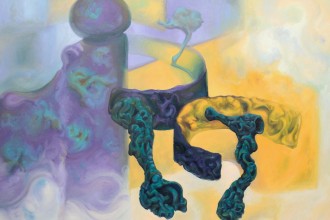He took out a copy of the Guardian Observer from his folio bag. They ran a feature in it on Sands — several pages of grainy black and white photos of him shot in a prison cell, a bearded man wearing his hair in long matted ringlets, wrapped in a blanket. His rather large eyes shone through the intense weave of hair and dirt on his face. Dark blobs covered the walls in the background. I read it was his shit.
Sands nearing his time felt like a close family friend inching towards an inevitable end that needn’t have been that way at all. I guess Baba was particularly perturbed because Sands was also a poet and novelist. In our home writers would be referred to by their first names. My parents would take sides and try to protect the ones they loved, get offended or pleased on their behalf. A writer not being able to follow up on the promise shown earlier in his career was seen as a major let-down, which would almost always be taken personally.
For example, Baba was increasingly unhappy with the poet Shakti Chattopadhyay’s work. He was convinced Chattopadhyay was losing it — both rhyme and reason. This was a rather radical view to take, as Chattopadhyay was the uncrowned king of poets in Bengal at the time. My mother loved his work and would have major fights with Baba, trying to make a case for Chattopadhyay’s place in history.
I would tease Baba, tell him he was just jealous. I quite liked the way Chattopadhyay’s poems would sometimes conjure up mod-psychedelic images, the sort I had seen on the album cover of Beatles’ Yellow Submarine.
Brishti porey ekhaney baaro mash
Ekhaney megh gabhi’r matow chorey
Parangmukh shobuj nali ghash,Â
Dooar chepe dhorey
Abani baari accho?
*Over here, it rains round the year
The clouds roam around like grazing cows
Green shoots of ardent straw-like grass
Plunge in and jam the doors
Abani, are you home?
Such lines played often on the radio and would be quoted at random by my father’s friends who came to collect contributions to the little magazines they edited. Sometimes I would dance an impromptu jig, repeating the lines like a chant, as Baba watched resignedly. Finally he would smile and try to sing along with me. He couldn’t hold a tune to save his life.
Sunil Gangopadhyay’s novel Shei Shomoy (Those Days), set in late-19th century Calcutta and featuring historical figures of the Bengal Renaissance, was being serialised in Desh in the early 1980s. My parents would often try to anticipate what its hero, Nabin Kumar, would do in the next episode or argue over something that did not work for them in the last. Ma, who had written fan mails to Gangopadhyay when she was a young girl, and preserved the responses she received, still reasonably enraptured by some of his earlier writing, would often have a problem with the twists and turns in the plotting of Shei Shomoy, some of which, she felt, were a cop-out. I liked the story in general but was getting a little impatient with the way the aristocratic, university-educated Gangacharan and Bindubashini, a young widow, kept going round in circles about their obvious attraction for each other. I thought Ganga was a bit of a wimp. I wished the two would run away together and leave the field to other, more action-oriented, players.
And then Ma got totally exasperated with the fights, which had become ritual, she would have with me over who got to read Desh first. I would keep a close watch on publication dates and prick my ears all morning to catch the sound of the approaching footsteps of the newspaper delivery man on days that a new edition was due. The sound of the magazine flopping down on the floor was my cue to run and grab it before anyone else could.
Bobby Sands died after sixty-six days of fasting. Baba would quit his job with the High Commission in another six years, wishing to turn into a full-time writer — a career that never quite took off.
I stopped reading ‘adult’ material and rolled back into the world of Enid Blyton.
*Part III will be published October 10th, 2016.
Chitralekha Basu is a writer of fiction, a translator, and a singer of Tagore songs. Her book, ‘Sketches by Hootum the Owl: a Satirist’s View of Colonial Calcutta’ – is a re-imagining of the first work of modern Bengali prose, written in 1861/62 by Kaliprasanna Sinha. She is interested in the comparative histories of Calcutta, her hometown, and Hong Kong, where she now lives.




